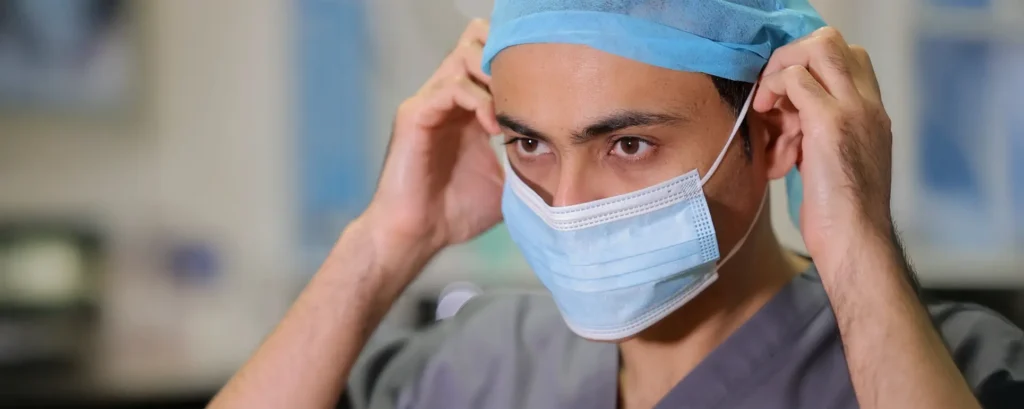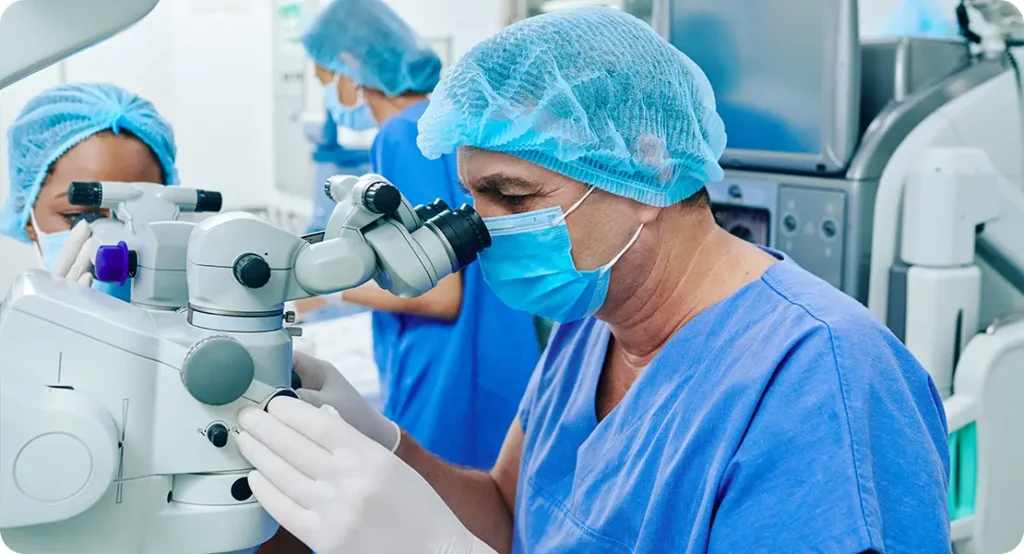If you’re living with severe allergies, mast cell activation syndrome (MCAS), or a history of strong reactions to medical products, the idea of having cataract surgery can feel daunting. Standard cataract surgery usually involves antiseptics like iodine, antibiotic drops, drapes, and sometimes sedation medicines. For most people, these are completely safe. But if your immune system is highly reactive, even a small trigger can set off a significant allergic response.
The good news is that modern cataract surgery is highly adaptable. Surgeons, anaesthetists, and nurses regularly work with patients who have allergies or sensitivities, and there are well-established ways of modifying the surgical plan to reduce risks. This article explores how cataract surgery is adjusted when allergies are part of the picture, the precautions taken before and during your procedure, and what you can do to feel reassured every step of the way.
Why Allergies Matter in Cataract Surgery
Allergies are essentially your immune system reacting too strongly to a substance that most people tolerate. While common allergies may only cause sneezing or mild rashes, severe ones can involve skin swelling, breathing problems, or even anaphylaxis. When you’re preparing for cataract surgery, the medical team needs to know in detail what substances you react to so they can plan around them.
Some patients are allergic to medicines such as penicillin or sulfa drugs. Others may react to antiseptics like povidone-iodine or to latex in surgical gloves. Even surgical drapes, adhesive plasters, or preservatives in eye drops can cause problems for highly sensitive individuals. By raising these concerns early, you give your care team time to adjust everything from the cleaning solution to the anaesthetic approach.
Cataract surgery is an elective procedure, which means it’s planned rather than performed in an emergency. This gives you and your surgeon the opportunity to carefully map out every step in advance. That planning is the single most important safety measure for patients with allergies.
Common Allergy Triggers in Eye Surgery
Several potential triggers are worth knowing about if you live with allergies:
- Antiseptics – Povidone-iodine is the standard antiseptic used to clean the eye before surgery. While highly effective at preventing infection, some people cannot tolerate it.
- Antibiotics – Eye drops or injections may contain antibiotics such as fluoroquinolones, penicillins, or cephalosporins, all of which can trigger reactions in susceptible patients.
- Latex – Though latex gloves are less common now, they can still appear in some surgical settings and are a known allergy trigger.
- Drapes and Adhesives – The sticky edges of surgical drapes or post-op patches sometimes contain adhesives that cause rashes or swelling.
- Anaesthetic Agents – Local anaesthetic eye drops and injection medicines are generally well tolerated, but in rare cases they may cause allergic-type responses.
- Preservatives – Multi-dose bottles of eye drops often contain preservatives such as benzalkonium chloride (BAK), which can irritate or inflame sensitive eyes.
Knowing these risks helps your surgeon and anaesthetist prepare alternatives that keep you safe and comfortable.
Pre-Surgery Planning: What to Expect

If you have a history of allergies, your pre-surgery assessment will be more detailed than usual. You’ll likely be asked:
- What specific substances cause reactions?
- How severe are those reactions (e.g. rash, swelling, breathing problems)?
- Have you ever been admitted to hospital for an allergic reaction?
- Are you taking antihistamines, mast cell stabilisers, or steroids?
- Do you carry an adrenaline auto-injector (EpiPen)?
Your answers guide the team in designing a tailored surgical plan. For example, if you’re allergic to iodine, they may switch to a diluted chlorhexidine solution. If you’re sensitive to certain antibiotics, they’ll choose a different prophylactic agent.
In some cases, your eye surgeon may also consult with your allergist or immunologist to get a clear risk profile. This kind of joined-up care ensures that nothing is overlooked.
Alternatives to Standard Antiseptics
The most common antiseptic in cataract surgery is povidone-iodine, but if you can’t tolerate it, surgeons have other options. Chlorhexidine, for instance, can be safely used on the eye surface in diluted form. It’s also highly effective against bacteria and viruses.
The choice depends on your allergy history. If you’ve reacted to iodine but not chlorhexidine in the past, chlorhexidine is a natural alternative. For very complex allergy cases, the surgeon may even arrange for patch testing before the procedure to identify safe options.
The important thing to know is that avoiding antiseptic altogether isn’t an option, because infection prevention is critical. Instead, your team will find a substitute that’s effective but doesn’t trigger your system.
Managing Medication Allergies
Medication allergies are another concern. Some patients are allergic to penicillin-type antibiotics, while others may have issues with sulfa drugs or certain eye drop ingredients. Since antibiotics are commonly given during or after cataract surgery, alternatives need to be chosen.
For example, if you can’t have fluoroquinolone drops, your surgeon may prescribe macrolide antibiotics or other safe substitutes. If you react to preservatives in drops, single-use preservative-free formulations are available. These adjustments are routine in allergy-sensitive patients and can make a big difference to your comfort and recovery.
Mast Cell Activation Syndrome and Surgery
Patients with mast cell activation syndrome (MCAS) often worry the most about surgery. Because mast cells can react unpredictably, even mild stress or physical stimuli may trigger hives, flushing, or more severe symptoms. In this scenario, the surgical team usually coordinates closely with your immunologist.
You might be advised to take pre-medication with antihistamines or mast cell stabilisers before surgery. Some patients are also given steroids to reduce the risk of an acute flare during the operation. The anaesthetist will be fully briefed so that sedation, if needed, is chosen carefully.
Importantly, the surgical environment is controlled, meaning any reaction can be quickly treated. That knowledge alone helps many patients feel reassured.
What Happens on the Day of Surgery

On the day of surgery, everything is double-checked. The nurse will go through your allergy history again to make sure the correct preparations are in place. You’ll be in a latex-free environment if necessary, and all your eye drops will be preservative-free if that has been flagged.
During the operation itself, which usually lasts less than 30 minutes, the team monitors you closely. If you’ve been pre-medicated, that reduces the chance of reactions. Emergency medicines, including adrenaline, are always on standby – though in practice, severe allergy incidents during cataract surgery are very rare.
After surgery, you’ll be observed for longer than standard patients to make sure no delayed reaction occurs. If you’ve had problems with adhesives or dressings in the past, you may be given a non-adhesive shield instead of a sticky eye pad.
Recovery and Follow-Up in Allergy-Sensitive Patients
Recovery after cataract surgery is usually smooth, even for allergy-sensitive patients. The main differences are:
- Medication Choices – Preservative-free, alternative antibiotics or anti-inflammatory drops may be prescribed.
- Longer Observation – Some patients are kept in recovery a little longer to ensure no delayed reaction.
- Close Monitoring – Your surgeon may arrange more frequent check-ups in the first week.
The key is communication. If you notice redness, itching, or unusual swelling, you should report it straight away. Often these are just local irritations, but it’s important to rule out anything more serious.
Practical Tips for Patients with Severe Allergies
- Bring a written allergy list to every appointment.
- Tell your surgeon about even minor reactions – they may point to a broader pattern.
- Ask about preservative-free medications if your eyes are sensitive.
- Keep your antihistamines or emergency medications (such as an EpiPen) with you on the day of surgery.
- Don’t be afraid to ask for clarification about what alternatives will be used.
Remember, cataract surgery is one of the most successful operations in medicine, and your surgeon’s goal is to make it just as safe for you as for anyone else.
FAQ: Cataract Surgery and Severe Allergies

1. Can I still have cataract surgery if I’m allergic to iodine?
Yes, cataract surgery is still possible if you are allergic to iodine. The main reason iodine is used in surgery is as an antiseptic to clean the eye and reduce the risk of infection. If you have had reactions to iodine in the past, your surgeon will prepare an alternative, such as diluted chlorhexidine, which is also highly effective at killing bacteria and viruses. The key is making sure your allergy is discussed during your pre-operative assessment, so that the team can put the safest plan in place before the day of surgery.
2. What if I’m allergic to antibiotics normally given after surgery?
Antibiotics are routinely used to reduce the chance of infection, but there are many different types available. If you are allergic to one family of antibiotics, such as penicillin or fluoroquinolones, your surgeon will choose a safer alternative that your body can tolerate. Some patients with multiple allergies are also prescribed preservative-free antibiotic drops to avoid irritation from additives. This is all part of tailoring your care to your medical history, so you can still be fully protected against infection while avoiding unnecessary risks.
3. Is cataract surgery riskier if I have mast cell activation syndrome?
Having mast cell activation syndrome (MCAS) does not mean cataract surgery itself is unsafe, but it does mean that your body might be more likely to overreact to certain triggers during the process. To reduce this risk, your care team may recommend taking antihistamines, mast cell stabilisers, or even a short course of steroids in the lead-up to surgery. The anaesthetist will also avoid medicines that are more likely to trigger mast cell degranulation. Because you’ll be in a controlled medical environment, any unexpected reaction can be treated quickly, which helps make the whole procedure safer.
4. Could anaesthetic drops trigger an allergic reaction?
Local anaesthetic drops are widely used in cataract surgery and are generally very safe, but as with any medication, it’s possible for sensitive patients to react. If you have ever had an unusual response to numbing agents at the dentist or during previous surgery, it’s important to mention this during your pre-assessment. Your surgeon may test a small amount beforehand or switch to an alternative anaesthetic to keep things comfortable. With careful planning, even patients who have reacted to anaesthetics in the past can usually have surgery without major issues.
5. What about latex allergies – should I be worried?
Latex allergies used to be a bigger concern, but many hospitals and private clinics are now completely latex-free or can easily provide a latex-free surgical setup. If you have a confirmed latex allergy, the nursing team will make sure that gloves, drapes, and any other surgical materials are safe for you. This is something they deal with regularly, so while it is important to flag it in advance, it should not prevent you from having cataract surgery safely.
6. How can I reduce my chances of a reaction on surgery day?
Preparation is the most effective way to reduce your risk. This includes providing your surgeon with a clear, written list of all your allergies and past reactions, no matter how minor they seemed at the time. Following instructions about pre-medications, such as antihistamines or steroids, is also crucial if they are recommended. Bringing your own rescue medication, such as an adrenaline auto-injector if you have one, can offer added peace of mind. Most importantly, speak up if you have any concerns on the day — your care team will be expecting questions and will be glad to reassure you.
7. What if I’m allergic to the adhesive on surgical patches?
Some patients develop redness, itching, or swelling from the adhesive on standard surgical patches. If this applies to you, there are alternatives that can be used instead. Hypoallergenic adhesives or non-adhesive eye shields can be provided, which still protect your eye while avoiding skin reactions. It’s a small but important adjustment that can make recovery more comfortable and stress-free. Always let your team know about any issues with plasters, bandages, or dressings in the past, so they can prepare the right option.
8. Can stress itself trigger a reaction during cataract surgery?
Stress can indeed play a role in allergic or mast cell-related conditions. In some people, the emotional and physical stress of surgery can increase the likelihood of symptoms such as hives, flushing, or breathing changes. To counter this, your anaesthetist may offer mild sedation, relaxation strategies, or pre-medications to calm the immune system. The surgical team also works hard to create a calm environment and keep you informed, which helps reduce anxiety. Knowing that every precaution has been taken often makes patients feel more at ease, which itself reduces the chance of a flare.
9. Will I need to stay in hospital longer because of my allergies?
In most cases, patients with allergies still go home on the same day as their cataract surgery. The main difference is that you may be observed for a little longer in the recovery area to make sure there are no delayed reactions. If your medical history is especially complex, your surgeon may suggest a slightly longer stay for monitoring. However, this is precautionary rather than a sign of danger, and most people with allergy concerns recover smoothly without any need for extended hospitalisation.
10. Is it safe to use preservative-free drops after cataract surgery?
Yes, preservative-free drops are not only safe but often the preferred choice for patients with allergies or sensitive eyes. Standard eye drops sometimes contain preservatives like benzalkonium chloride, which can irritate or inflame the surface of the eye, especially after surgery. By using preservative-free formulations, you reduce the risk of irritation while still getting the full benefit of antibiotics or anti-inflammatory medication. These are widely available in single-use vials and are often prescribed when allergy is part of your medical history.
Final Thoughts
Having cataract surgery when you live with severe allergies does require extra preparation, but with careful planning it can be carried out safely. Surgeons and anaesthetists are used to managing these situations, and they will tailor every part of the procedure – from the antiseptic solution to the medications you take home – to minimise risks.
At London Cataract Centre, we often see patients with complex allergy histories, and we take pride in creating a calm, personalised surgical plan that addresses each concern. If you’re anxious about reactions, know that you won’t be facing the process alone – every step will be adapted to keep you safe and comfortable.

